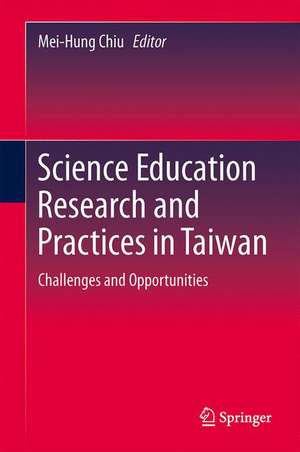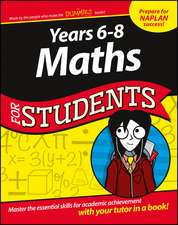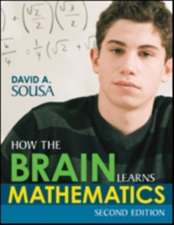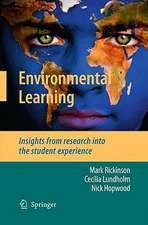Science Education Research and Practices in Taiwan: Challenges and Opportunities
Editat de Mei-Hung Chiuen Limba Engleză Hardback – 13 aug 2015
| Toate formatele și edițiile | Preț | Express |
|---|---|---|
| Paperback (1) | 648.74 lei 6-8 săpt. | |
| Springer Nature Singapore – 23 oct 2016 | 648.74 lei 6-8 săpt. | |
| Hardback (1) | 655.13 lei 6-8 săpt. | |
| Springer Nature Singapore – 13 aug 2015 | 655.13 lei 6-8 săpt. |
Preț: 655.13 lei
Preț vechi: 770.73 lei
-15% Nou
Puncte Express: 983
Preț estimativ în valută:
125.36€ • 131.32$ • 103.90£
125.36€ • 131.32$ • 103.90£
Carte tipărită la comandă
Livrare economică 09-23 aprilie
Preluare comenzi: 021 569.72.76
Specificații
ISBN-13: 9789812874719
ISBN-10: 9812874712
Pagini: 300
Ilustrații: XV, 450 p. 20 illus., 10 illus. in color.
Dimensiuni: 155 x 235 x 32 mm
Greutate: 0.83 kg
Ediția:1st ed. 2016
Editura: Springer Nature Singapore
Colecția Springer
Locul publicării:Singapore, Singapore
ISBN-10: 9812874712
Pagini: 300
Ilustrații: XV, 450 p. 20 illus., 10 illus. in color.
Dimensiuni: 155 x 235 x 32 mm
Greutate: 0.83 kg
Ediția:1st ed. 2016
Editura: Springer Nature Singapore
Colecția Springer
Locul publicării:Singapore, Singapore
Public țintă
ResearchCuprins
Preface.- Section 1 Overview of Science Education in Taiwan.- Chapter 1 Research Projects on Science Education Funded by the National Science Council in Taiwan from 1982 to 2012: A Historical Review.- Chapter 2 Trends in Science Education Research in Taiwan: A Content Analysis of the Chinese Journal of Science Education from 1993 to 2012.- Chapter 3 Comments on Section 1: Development of Science Education Research in Taiwan.- Section 2 Science Learning and Assessment.- Chapter 4 Content Analysis of Conceptual Change Research and Practice in Science Education: From Localization to Globalization.- Chapter 5 Learners’ Epistemic Beliefs and their relations with Science Learning – Exploring cultural differences.- Chapter 6 On the Identification of Students’ Misconceptions in a Two-tier Item.- Chapter 7 Elementary Science Education in Taiwan – from the perspective of international comparison.- Chapter 8 Comments on Section 2.- Section 3 Innovative Technology for Science Learning and Instruction in Taiwan.- Chapter 9 Innovative Technology-Assisted Science Learning in Taiwan.- Chapter 10 Development and Evaluation of Technology-Infused Learning Environments in Taiwan.- Chapter 11 Innovative Science Educational Neuroscience: Strategies for Engaging Brain Waves in Science Education Research.- Chapter 12 Methodology and Application of Eye Tracking Techniques in Science Education.- Chapter 13 Public Communication of Science and Technology in Taiwan.- Chapter 14 Comments on Section 3: Innovative Technologies for Science Learning and Instruction in Taiwan: A global perspective.- Section 4 Curriculum and Teacher Professional Development.- Chapter 15 Taiwanese Science Teacher Education Research – Capturing the spirit of PCK.- Chapter 16 Design to Understand Curriculum: Epistemic Practices, Teaching and Learning in Science.- Chapter 17 Integrating Paiwan Culture into the Design of a Science Curriculum, with Teaching Examples.- Chapter 18 Teaching EnvironmentalIssues in Science Classroom: Status, Opportunities, and Strategies.- Chapter 19 Comments on Section 4: Thoughts on Science Curriculum Reform and Teacher Learning in Western Countries and Taiwan.- Section 5 Reflections.- Chapter 20 An International Perspective on the People and Events Shaping Science Education in Taiwan – Past, Present and Future.- Chapter 21 A collection of reflections from international scholars.- Chapter 22 Epilogue.
Notă biografică
Mei-Hung Chiu is a Professor of Science Education at the Graduate Institute of Science Education (GISE) of the National Taiwan Normal University (NTNU). Her research areas include conceptual change on students’ understanding of scientific phenomena as well as alternative assessment in science teaching and learning. In extending the research on conceptual change, she investigated how to promote students’ perceptions of scientific models and to develop model-based inquiry and modelling competency in learning science. Another work explores whether changes in facial micro expressions can be used to identify moments of conceptual conflict, one of the pathways to conceptual change. More recently, she adopted mobile technology and augmented reality techniques to design instructional materials for high school students’ learning in science. Dr. Chiu published over 100 peer reviewed international and national journal articles and supervised close to 90 advisees in master and doctoral programs in science education. Dr. Chiu was the President of the Association of Science Education in Taiwan (2009-2010). She has also served as the international coordinator for International Committee of National Association for Research in Science Teaching (NARST) based in the United States from 2008 to 2010 and as the chair for Committee on Chemistry Education of International Union of Pure and Applied Chemistry (IUPAC) from 2011 to 2015. She was a recipient of the Distinguished Contribution to Chemical Education Award from the Federation of Asian Chemical Societies (FACS) in 2009.
Textul de pe ultima copertă
This book highlights the development and outcomes of research on and practical experience in science education in Taiwan. As the outcomes of the scholarship on science education in Taiwan have garnered attention in science education communities around the world, this book gathers the most relevant research on Taiwan, presenting it in a cohesive overview that will move science education forward in terms of policy, research and practice.
Caracteristici
Highlights the development and outcomes of research and practice in science education in Taiwan Provides a unique collection of short commentaries and reflections from international scholars Opens an avenue for countries which is interested in reforming science education to explore potential strategies and policies Includes supplementary material: sn.pub/extras







